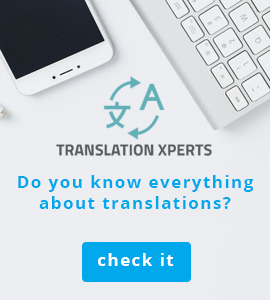All You Need To Know About Translating Legal Documents
Legal translations are, quite fittingly, considered one of the most difficult. The complexity and specificity of legal jargon requires in-depth, exact expertise on both source and target language. This means that not all translators, even professional ones, can translate documents of legal importance. Why's that? Here are some facts about legal document translation that everyone should know.
What is legal translation?
Legal translation is a collective term for translations of a wide range of law-related documents. Any legal document uses specific terms or even sentence structures that are, in many cases, unique to a given type of documents. Therefore, legal translators have far more difficult assignments than ‘regular’ translators - they're never as straightforward as e.g., translating a simple manual.
Legal translation requires expert knowledge of a given subject and a thorough understanding of principles governing both source and target languages. For example, when it comes to foreign trade documents, the translator must know and understand the other country's laws and regulations concerning importing, sale of goods, taxes, etc.
A legal translation will be considered valid only if it's certified. In the UK officially recognized legal translation services can be provided by officially registered translators and translation agencies that are members of ATC (Association of Translation Companies). A translated document will also be considered ‘certified’ if it was translated outside the UK by a ‘sworn translator’ or if it's certified in front of a solicitor.
Keep in mind that any certified translation must be dated, signed and stamped by its translator. It should also include a translation certificate of it being a professional and accurate translation of the original document. If the certified translation service was provided by a translation agency, it would also include a declaration confirming the TA's details as the translation's provider and its accreditation to translate and certify legal documents.
Documents that require certified translation
The list of documents that need legal translation is quite long and can be broken into four subgroups - government, immigration, court, and business/corporate dealings.
The government documents group consists of any document that is submitted to a legal or governmental body. The most common are:
- Birth and death certificates
- Adoption agreements
- Application letters
- Technical patent confirmations
- Wills and testaments.
Immigration documents would be everything that is needed in applications for residency or temporary visitor’s permit in a foreign country (the exact requirements might vary greatly per country). Those include, e.g.:
- Birth certificates
- Driving licence
- Passports
- Certificates of citizenship (or other documents proofing immigration status).
The term court documents applies to documentation used in hearings and trials. Those would be:
- Court transcripts
- Witness' statements
- Deposition records
- Evidence documents
- Litigation materials.
When business/corporate dealings go abroad or a company wants to up its global visibility, some documents will require legal translations. The most important among them are:
- Legal disclaimers and terms of service
- Corporate and government proposals
- Business contracts
- Confidentiality agreements
- Patent filings
- Financial reports.

Why is legal translation different from other types of translations?
Legal translation services aren't as simple as replacing words - a translated legal document must retain its exact meaning and tone as any ambiguities may invalidate the whole text. Here are some things that differentiate this process from other translations:
It depends heavily on reference materials
While translating legal documents, translators must constantly rely on various reference materials, like civil and commercial law codes of the target language. This ensures the right use of nuanced terms typical for legal proceedings, but also lengthens the process as almost everything must be cross-referenced, especially if the legal terminology has even the slightest ambiguity to it.
There's no room for error
There are some factors that eliminate any margin of error while translating legal documents.
First, there are strict deadlines. For example, if a given document is needed in court, any delay expanding beyond the submission period renders it completely useless. Thus, legal translators must be able to work in specified timeframes, and you should always remember to request translations in advance.
Translators must be constantly up-to-date with legal developments, as the law constantly changes and evolves.
Retaining the original tone is another major factor here. For instance, if the urgency of a legal notice isn't communicated clearly enough in another language, the reader may fail to act accordingly to the situation's severity.
Some linguistic structures used prominently in one language might not have direct equivalents in the target language. The translator must thus be able to find suitable language structures that can convey the original message of the source material.
Rules differ by country
It shouldn't be a surprise that different countries may and likely have their own distinctive legal systems. So on top of any applicable international laws, legal translators must know the nooks and crannies of the target country's legal system to be able to provide a complex and accurate legal document translation.
Moreover, each country might have its own policy regarding legal translation. For example, many countries require legal translators to have a degree in a given field (e.g., business) in addition to being officially certified by the state.
It uses specific vocabulary
Most legal documents use very specific structures and can be really jargon-heavy. This often makes them hard to understand even in their source language, as they can have multiple meanings. If you add cultural and regional differences of the given language/country, the translation of legal documents becomes a true challenge.
For instance, English legal documentation relies heavily on long, compound sentences with high levels of complexity that are regularly being written in passive voice, which makes them hard to read and even harder to understand (just like this overly extended example). This could get even trickier, if the target language uses active voice in its legal documentation.
Make sure to choose the right translator!
Most of the legal documents contain highly sensitive data that requires the highest level of confidentiality. Taking this and all the above factors into account, the legal translator you hire must be a trustworthy professional with years of experience and in-depth knowledge of international law and a given industry jargon. Not all professional translators can perform legal document translation and finding one that meets all the criteria might be troublesome. You're not sure where to look for the right translator? Try at TEXTOLOGY - a London based translation company that hires native-speaking language experts.
External partner's article











